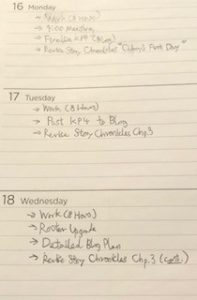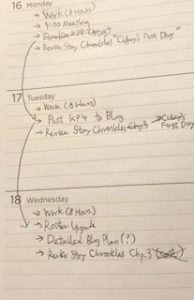Welcome to the cKotch.Com blog. I’m Christopher Kotcher, and this is Kotcher’s Pen. Time to delve into my writing’s inner workings.

Writer’s Worst Fear
This week presents a rare creative problem. When time came to prep my weekly post, writer’s block came over me.
My original plan was to grace your screens with a Game Story post about Nintendo’s life simulation series Animal Crossing.
I wanted to recollect my history with the series in honor of the newest release, Animal Crossing: New Horizons. We would once more examine storytelling methods unique to gaming.
Like usual, I was going to compare the medium to the written word and see what possible lessons could be learned across the formats.
However, when planning time came this week, I realized my desired Animal Crossing post would fall flat unless I had already played the latest game for a good chunk of time.
Trust me, you’ll hopefully understand what I mean in about a month.
Now, this was somewhat annoying, but it didn’t seem too big a deal at first. After all, my plans change all the time regarding the order of blog posts.
I may plan a few things in advance, but in the end, I tend to write whatever topic most intrigues me each week. Coming up with something on the fly for this week should’ve been no different.
Instead, no ideas came. My pencil hovered over empty pages in my planning notebook. My keyboard didn’t see any fingers for days.
Worry began setting in.
Would I have to follow last November’s example and take a brief hiatus until a few more posts could appear in the pipeline?
Thankfully, the answer there would prove no. In an ironic yet obvious twist of fate, I turned my issues this week into my topic.
That’s right. This week’s post has become a Kotcher’s Pen post discussing writer’s block.
I’m going to look at some types of writer’s block which have blocked my creative juices over the years. I’ll also cover some of the tricks I’ve used to address each of them.
Hopefully, this post can be a good resource in facing the infamous boogeyman which has haunted all creatives once or twice.
And for those who don’t write, stay tuned. As always, I’m sure there’s some general wisdom and advice you can pull out of this stuff.
Writing and Living
Let’s start with something common that isn’t always seen as writer’s block, even though it keeps prospective and established writers alike from writing.
Writing requires living.
Informative writers live their subject areas. Technical writers practice processes they then communicate. Creative writers pull inspiration from impactful stories, memories, and events.
Unfortunately, living isn’t always accommodating to writing.
The students are bogged down with homework and studying. Free time becomes almost as much an unaffordable luxury as a decent meal.
The career people return home far too tired to sit in front of another computer screen. Their tired eyes have already absorbed enough blue light for the day.
The weekend hobbyists sleep in past noon. They try to get back on track after lunch. Then they find a comfortable spot on the couch and something decent to watch on TV.
In short, life not only fuels your writing, but also delays or interrupts your craft constantly.
Now, don’t think I’m telling you stop living your life. No passion, even writing, is worth ignoring your responsibilities and loved ones.
The solution is to find ways to fit your passion into your life. Look at the things in your life which keep you from writing. Mitigate what makes them into obstacles for you.

For me, tired eyes after long days of schoolwork and work-work was something big to work around. I didn’t want to stare at another screen and keep my brain turned on.
So, I started doing the majority of my writing in notebooks. Those paper lines are much easier on the eyes that a screen’s blue light.
True, I still ultimately need to type things for the sake of storage, security, editing, and workshopping. However, I can now save this part for the weekend, already having the words transcribed and my eyes being fully awake.
Another good strategy can be to get up earlier in the morning and write before you life gets going.
I only really used this strategy when I had college night classes. Filling the morning with writing proved far better than squeezing it in during the few free hours at the end of a long night.
There are other writers though where this strategy became the key to success.
Off the top of my head, sci-fi writer Octavia Butler seems the best example. She used to get up at two or three in the morning to write. Thanks to work and night classes, that was her best time.
Remember, you can always make the time to do what you love.
You may not like how you have to make that time. You may take a while to get used to the change. However, this is the only way to break the block.
The Schedule Serves You
Here’s a form of writer’s block that can really sting you once you get going.
In the last section, I praised making time to write. One of the best ways to achieve that change would be to create a schedule to dedicate time and set goals.
However, there is a risk inherent to any schedule. All would be well-advised to be aware of this risk.
There is a great temptation to subordinate yourself to you schedule.
I’ll give you an example from my experience with my blog. The weekly schedule here is the most demanding self-imposed schedule my writing has ever had.
I pick a day to lay out a plan. I set four days for blog writing, tackling one or two sections each of these days. By the end of the week, I grab some photos, do some final edits, and prepare everything in WordPress.
Suddenly, I don’t get to the point I want to reach one day. This could be because life gets in the way, or this could be because a section takes longer to write than originally envisioned.
Do you know what can become my greatest enemy in this situation?
My schedule.
If you make yourself a servant to your schedule, you will feel like a failure for not meeting its lofty requirements and strict demands.
Even worse, you can feel pressured to rush your writing even in situations where you have plenty of time.

Look back to the introduction. Do you think this post still perfectly fit my schedule when I switched it from Animal Crossing to writer’s block?
If I was too dedicated to my schedule, then I either would’ve kept writing a post that wouldn’t have satisfied me, or I would’ve rushed this one.
However, I recognize that the schedule I create is meant to guide me. I am the person. My schedule is a tool.
My schedule does not deserve me placing it on a pedestal above myself. I deserve more than being second to my schedule.
Checking off items on my schedule is great. Keeping on track is awesome.
However, there are times where goals should be rearranged. Ideally, schedules shouldn’t be followed to the detriment of quality, of creating something you can legitimately take pride in.
The First Words
Let’s finish with one of the more commonly known forms of writer’s block.
I can best explain this one by recounting a scene from the classic SpongeBob episode “Procrastination.”
Tasked with writing an essay for boating school, SpongeBob wastes hours thinking of how to start. Finally, he puts pencil to page in masterful strokes and powerful thrusts.
When the triumphant sponge releases his pencil, he grabs his paper and smiles. He has created one of the most impressive instances of the word “The” ever written on a mostly blank page.
SpongeBob then slams his hands on the table and calls for another break.

Those cartoonists knew that finding the first words for anything is tricky.
You want to start out running. You want the perfect beginning for your brilliant masterpiece.
For longer works, this anxiety doesn’t even crop up only at the beginning. Every single chapter or section presents a fresh start of sorts. A first-word block can stop you at any of these points.
So, how do you recover here?
To be frank, you simply get over yourself and write.
Your writing doesn’t have to be perfect immediately. There’s no shame in pushing out a lame first draft that no one in their right mind would wish to read.
Having something written on a page is always better than nothing.
Typing at least a few words here and there is at least a couple steps forward.
Staring at a blank computer screen for hours at a time or ripping out all the pages in a notebook could only be a lateral move at best.
Your first draft of you work will never perfectly represent the vision in your head. In fact, no revision of your work will ever perfectly represent it.
However, you can approximate your grand vision with gradual movements made through continual editing and revision.
Let your writing flow from you, even if you think your first batch of words will do everything you want it to do. Nothing in your writing is set in stone until you’re ready to make it so.
Discussion Time!
What do you think of the forms of writer’s block I’ve covered? Do you agree or disagree with any of my points here?
I feel I’ve been working without a lot of different ideas in this post. Do you think I connected them well enough to each other? I believe they can all be synthesized with each other, but I’m interested to hear what you have to say.
Kotcher’s Call to Action
As I finish this post, I realize it contains many similar ideas to my previous Kotcher’s Pen post The Joys of Revision. Be sure to check that it out if you’ve liked what you see here.
Also, if you like my content and wish to see more, you could check out my books Five Strange Stories and Good Stuff: 50 Poems from Youth on Amazon. They are enrolled in the Kindle Matchbook program, so anyone who buys the paperbacks can also get the eBooks for free.
Finally, be sure to like my Facebook page and share it with your friends. I post a link there whenever a new blog post goes live each Friday at 5:00 PM EST.